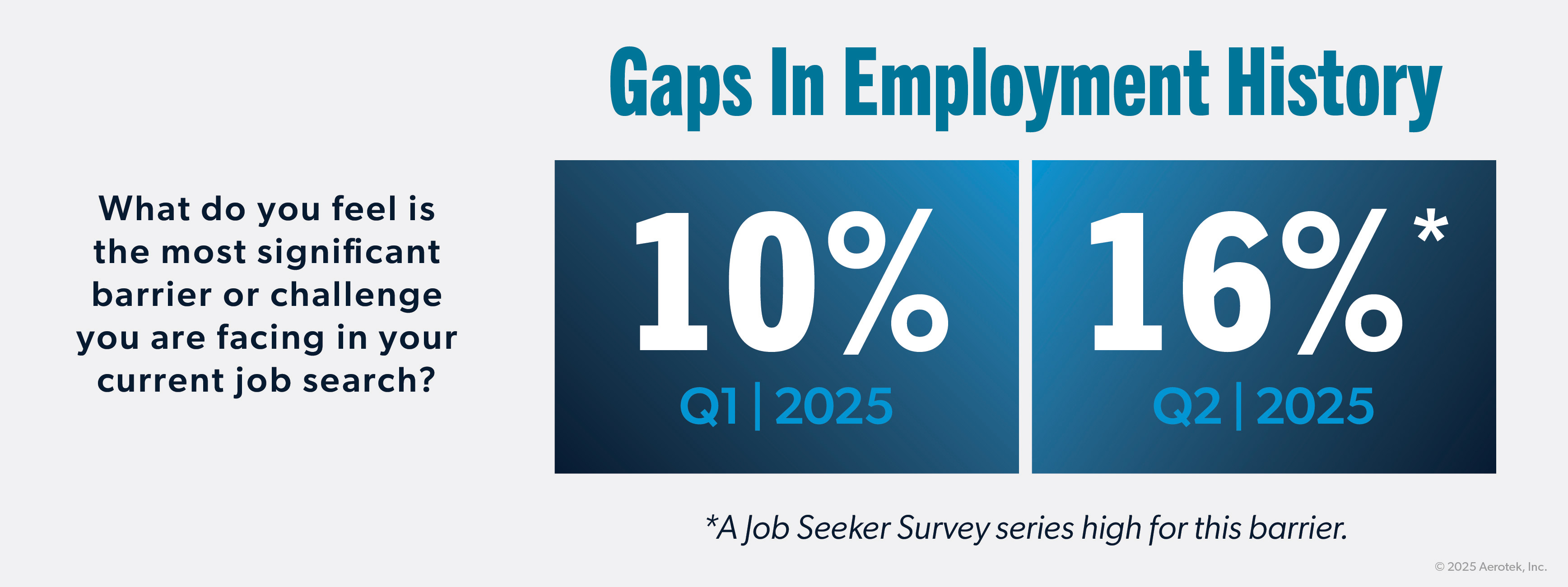55% of Job Seekers Feel the Economy Is the Biggest Barrier to Achieving Career Goals
Economic Concerns Rise Among Job Seekers
According to our Q2 2025 Job Seeker Survey, 55 percent of respondents chose “the economy/job market” as the biggest barrier to their current job search - up significantly from 39 percent in Q1 2025. The beginning of the year is when many applicants begin their job search which coincides with when many companies often finalize their budgets and ramp up hiring. However, as the year has progressed, the economic and labor landscape has become more difficult to predict. While U.S. job growth has remained strong, job seekers perceptions aren’t remaining as stable.


Other Barriers Impacting Job Searches
Survey respondents consistently flagged the economy as their primary challenge to their job search throughout our Job Seeker Survey series. On average, over 50 percent of respondents stated that economic barriers are the most significant challenge they face in their job search. Despite the concerns job seekers share about the economy, there are other factors they believe impede their careers.Gaps In Employment
Employment history gaps are traditionally ranked second in job search challenges based on survey results. 16 percent of respondents selected it as the primary barrier in our most recent survey, a series high for this option.
Misaligned Qualifications
Our most recent survey reveals that about a quarter of job seekers don’t feel adequately skilled for their desired job. 14 percent feel they are overqualified, and 11 percent feel they lack the skills for the job they want. When your skills aren’t aligned with the job you want to perform, you are less likely to be engaged in your work, often resulting in poor performance and even safety violations. Employers need to understand these feelings and create pathways for skill development and career advancement. By providing tailored training programs, companies can help bridge the gap and improve overall job satisfaction and performance.Implications for Employers
For companies seeking to improve their hiring practices, there are several key takeaways from this survey data. The rise in job seekers perceiving gaps in employment history as a significant barrier signals to employers the importance of re-evaluating their perspectives on employment gaps. Rather than viewing these gaps as red flags, employers should consider the broader context.
For hiring and retention strategies, this survey data underscores the need for a more flexible and inclusive approach. Economic barriers, such as hiring slowdowns and market fluctuations, significantly impact job searches and job seeker confidence. It highlights the importance of fostering a work culture that values continuous learning and career development.
Additionally, economic constraints often force individuals to accept positions outside their expertise, leading to mismatched qualifications and dissatisfaction. Addressing the issue by aligning job requirements more closely with actual job duties can help employers attract and retain top talent who might otherwise be discouraged by perceived barriers.
Addressing the job search challenges faced by applicants — whether gaps in employment history or mismatched qualifications — requires a proactive and empathetic approach from employers. The insights from our survey highlight the importance of reevaluating traditional hiring practices to create a more inclusive and supportive work environment, especially in times of economic uncertainty. As we move forward, these strategies will be crucial in building a resilient and dynamic workforce.
